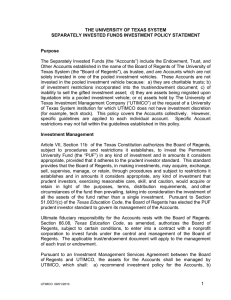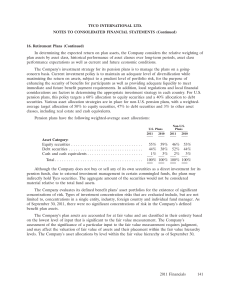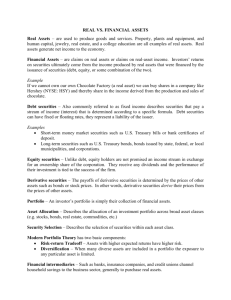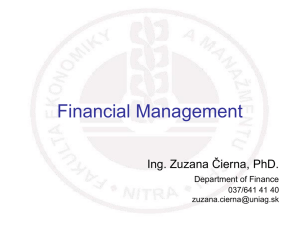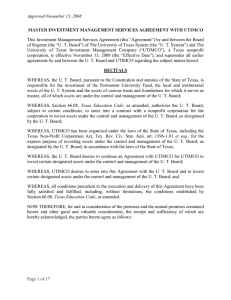The Separately Invested Funds (the “Accounts”) include the Endowment, Trust,... Proceeds, and Other Accounts established in the name of the... THE UNIVERSITY OF TEXAS SYSTEM
advertisement
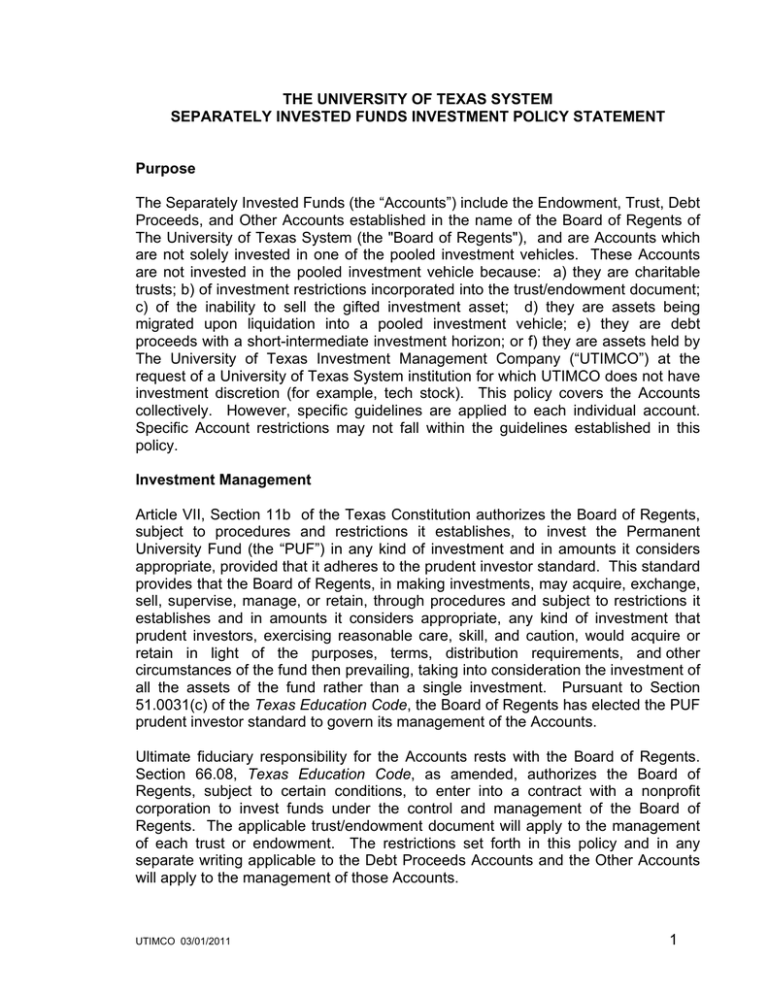
THE UNIVERSITY OF TEXAS SYSTEM SEPARATELY INVESTED FUNDS INVESTMENT POLICY STATEMENT Purpose The Separately Invested Funds (the “Accounts”) include the Endowment, Trust, Debt Proceeds, and Other Accounts established in the name of the Board of Regents of The University of Texas System (the "Board of Regents"), and are Accounts which are not solely invested in one of the pooled investment vehicles. These Accounts are not invested in the pooled investment vehicle because: a) they are charitable trusts; b) of investment restrictions incorporated into the trust/endowment document; c) of the inability to sell the gifted investment asset; d) they are assets being migrated upon liquidation into a pooled investment vehicle; e) they are debt proceeds with a short-intermediate investment horizon; or f) they are assets held by The University of Texas Investment Management Company (“UTIMCO”) at the request of a University of Texas System institution for which UTIMCO does not have investment discretion (for example, tech stock). This policy covers the Accounts collectively. However, specific guidelines are applied to each individual account. Specific Account restrictions may not fall within the guidelines established in this policy. Investment Management Article VII, Section 11b of the Texas Constitution authorizes the Board of Regents, subject to procedures and restrictions it establishes, to invest the Permanent University Fund (the “PUF”) in any kind of investment and in amounts it considers appropriate, provided that it adheres to the prudent investor standard. This standard provides that the Board of Regents, in making investments, may acquire, exchange, sell, supervise, manage, or retain, through procedures and subject to restrictions it establishes and in amounts it considers appropriate, any kind of investment that prudent investors, exercising reasonable care, skill, and caution, would acquire or retain in light of the purposes, terms, distribution requirements, and other circumstances of the fund then prevailing, taking into consideration the investment of all the assets of the fund rather than a single investment. Pursuant to Section 51.0031(c) of the Texas Education Code, the Board of Regents has elected the PUF prudent investor standard to govern its management of the Accounts. Ultimate fiduciary responsibility for the Accounts rests with the Board of Regents. Section 66.08, Texas Education Code, as amended, authorizes the Board of Regents, subject to certain conditions, to enter into a contract with a nonprofit corporation to invest funds under the control and management of the Board of Regents. The applicable trust/endowment document will apply to the management of each trust or endowment. The restrictions set forth in this policy and in any separate writing applicable to the Debt Proceeds Accounts and the Other Accounts will apply to the management of those Accounts. UTIMCO 03/01/2011 1 Separately Invested Funds Investment Policy Statement (continued) Pursuant to an Investment Management Services Agreement between the Board of Regents and UTIMCO, the assets for the Accounts shall be managed by UTIMCO, which shall: a) recommend investment policy for the Accounts, b) determine specific Asset Class allocation targets, ranges and performance benchmarks consistent with the Accounts objectives, and if appropriate c) monitor the Accounts’ performance against Accounts objectives. UTIMCO shall invest the Accounts’ assets in conformity with this Policy Statement. UTIMCO may select and terminate unaffiliated investment managers subject to any limitations stated herein. Managers shall be monitored for performance and adherence to investment disciplines. Accounts Administration UTIMCO shall employ an administrative staff to ensure that all transaction and accounting records are complete and prepared on a timely basis. Internal controls shall be emphasized so as to provide for responsible separation of duties and adequacy of an audit trail. Custody of assets in the Accounts shall comply with applicable law and be structured so as to provide essential safekeeping and trading efficiency. Investment Objectives Endowment Accounts - The primary investment objective shall be to invest the Accounts in assets that comply with the terms of the applicable trust/endowment document, taking into consideration the investment time horizon of the Accounts. Trust Accounts - Trust Accounts are defined as either Foundation Accounts or Charitable Trusts ((Charitable Remainder Unitrusts (CRUT), Charitable Remainder Annuity Trusts (CRAT), Pooled Income Funds (PIF), or Charitable Trusts (CT)). The Board of Regents recognizes that the investment objective of a trust is dependent on the terms and conditions as defined in the trust document of each trust. The conditions that will affect the investment strategy are a) the trust payout provisions; b) the ages of the income beneficiaries; c) the ability to sell the gifted assets that were contributed to the trust; and d) consideration to investment preferences of the income beneficiaries. Taking these conditions into consideration, the fundamental investment objectives of the trust are to generate a low to moderate growth in trust principal and to provide adequate liquidity in order to meet the payout provisions of the trust. Debt Proceeds Accounts – The primary investment objective shall be safety of principal and maintenance of adequate liquidity sufficient to meet the spend-out schedules of each Account, as provided by the U. T. System Office of Finance. Debt Proceeds Accounts, other than investments in cash as defined in the Liquidity Policy, will be invested in U.S. government obligations, including obligations of an UTIMCO 3/01/2011 2 Separately Invested Funds Investment Policy Statement (continued) agency or instrumentality of the United States, taking into consideration the spending needs of the Accounts. Other Accounts – These are all accounts which are not Endowment Accounts, Trust Accounts, or Debt Proceeds Accounts that hold assets not invested in one of the pooled investment vehicles. These accounts include agency funds, institution current purpose accounts, and tech stock accounts. Asset Class Allocation Asset Class allocation is the primary determinant of the volatility of investment return and subject to the Asset Class allocation ranges specified herein, is the responsibility of UTIMCO. Specific Asset Class allocation positions may be changed from time to time based on the economic and investment outlook. Unless otherwise restricted herein, the Accounts’ assets shall be allocated among the following broad Asset Classes based upon their individual return/risk characteristics and relationships to other Asset Classes: Asset Classes: Investment Grade Fixed Income – Investment Grade Fixed Income represents ownership of fixed income instruments, including real and nominal, US and non-US, and across all maturities that are rated investment grade, including cash as defined in the Liquidity Policy. Credit-Related Fixed Income – Credit-Related Fixed Income represents ownership of fixed income instruments, including real and nominal, US and non-US, and across all maturities that are rated below investment grade. Natural Resources - Natural Resources represents ownership directly or in securities, the value of which are directly or indirectly tied to natural resources including, but not limited to, energy, metals and minerals, agriculture, livestock, and timber. Real Estate - Real Estate represents primarily equity ownership in real property including public and private securities. Developed Country Equity – Developed Country Equity represents ownership in companies domiciled in developed countries as defined by the composition of the MSCI World Index. Emerging Markets Equity – Emerging Markets Equity represents ownership in companies domiciled in emerging economies as defined by the composition of the MSCI Emerging Markets Index. In addition, such definition will also include those companies domiciled in economies that have yet to reach MSCI UTIMCO 3/01/2011 3 Separately Invested Funds Investment Policy Statement (continued) Emerging Markets Index qualification status (either through financial or qualitative measures). In addition, life insurance and variable annuities may be acceptable investments. Asset Class Allocation Policy The Asset Class allocation policy and ranges for the Endowment and Trust Accounts are dependent on the terms and conditions of the applicable trust/endowment or trust document. The Asset Class allocation policy and ranges for the Debt Proceeds and Other Accounts will be determined by the terms and conditions of any applicable documents. If possible, the Accounts’ assets shall be diversified among different types of assets whose returns are not closely correlated in order to enhance the return/risk profile of the Accounts. The Board of Regents delegates authority to UTIMCO to establish specific Asset Class allocation targets and ranges for each Account. UTIMCO may establish specific Asset Class allocation targets and ranges for or within the Asset Classes listed above as well as the specific performance benchmarks for each Asset Class. Performance Measurement The investment performance of the actively managed Accounts, where cost effective, will be calculated and evaluated quarterly. Investment Guidelines The Accounts must be invested at all times in strict compliance with applicable law. Investment guidelines include the following: General • Investment guidelines for index, commingled funds, limited partnerships, and corporate vehicles managed externally shall be governed by the terms and conditions of the respective investment management contracts, partnership agreements or corporate documents. • Investment guidelines of all other externally managed accounts as well as internally invested funds must be reviewed and approved by UTIMCO’s Chief Investment Officer prior to investment of SIF assets in such investments. • All investments will be U.S. dollar denominated assets unless held by an internal or external portfolio manager with the authority to invest in foreign currency denominated securities. UTIMCO 3/01/2011 4 Separately Invested Funds Investment Policy Statement (continued) • No securities may be purchased or held which would jeopardize, if applicable, the Account’s tax-exempt status. • No internal investment strategy or program may purchase securities on margin or use leverage unless specifically authorized by the UTIMCO Board. • No internal investment strategy or program employing short sales may be made unless specifically authorized by the UTIMCO Board. The Account may utilize derivatives only in accordance with the Derivative Investment Policy. Investment Grade Fixed Income Permissible securities for investment include the securities within the component categories of the Barclays Aggregate Bond Index (BAGG). These component categories include investment grade government and corporate securities, agency mortgage pass-through securities, and asset-backed securities. These sectors are divided into more specific sub-sectors: 1) Government: Treasury and Agency; 2) Corporate: Industrial, Finance, Utility, and Yankee; 3) Mortgage-backed securities: GNMA, FHLMC, and FNMA; 4) Asset-backed securities; 5) Municipal securities; and 6) Commercial Mortgage-backed securities. In addition to the permissible securities listed above, the following securities shall be permissible: a) Floating rate securities with periodic coupon changes in market rates issued by the same entities that are included in the BAGG as issuers of fixed rate securities; b) Medium term notes issued by investment grade corporations; c) Zero coupon bonds and stripped Treasury and Agency securities created from coupon securities; and d) Structured notes issued by BAGG qualified entities. • U.S. Domestic Bonds must be rated investment grade, Baa3 or better by Moody’s Investors Services, BBB- by Standard & Poor’s Corporation, or BBBor better by Fitch Investors Service at the time of acquisition. • Not more than 35% of the Account’s fixed income portfolio may be invested in non-U.S. dollar bonds. Not more than 15% of the Account’s fixed income portfolio may be invested in bonds denominated in any one currency other than U.S. dollar. UTIMCO 3/01/2011 5 Separately Invested Funds Investment Policy Statement (continued) • Non-dollar bond investments shall be restricted to bonds rated equivalent to the same credit standard as the U.S. Fixed Income Portfolio. • Not more than 7.5% of the Account’s fixed income portfolio may be invested in Emerging Market debt. • International currency exposure may be hedged or unhedged at UTIMCO’s discretion or delegated by UTIMCO to an external investment manager. • Permissible securities for investment include Fixed Income Mutual Funds and Debt Index Funds as approved by UTIMCO’s Chief Investment Officer. • Permissible securities for investment include Fixed Income Variable Annuity Contracts as approved by UTIMCO’s Chief Investment Officer. Credit-Related Fixed Income Not more than 5% of the market value of fixed income securities may be invested in corporate and municipal bonds of a single issuer. Real Estate, Natural Resources, Developed Country Equity, and Emerging Markets Equity • Not more than 25% of the market of equity securities may be invested in any one industry or industries (as defined by the standard industry classification code and supplemented by other reliable data sources) at cost. • Not more than 5% of the market value of equity securities may be invested in the securities of one corporation at cost. • Not more than 7.5% of the market value of equity and fixed income securities taken together may be invested in one corporation at cost. The provisions concerning investment in Investment Grade Fixed Income, CreditRelated Fixed Income, and Real Estate, Natural Resources, Developed Country Equity, and Emerging Markets Equity shall not apply to Accounts when expressly prohibited by the terms and conditions of the applicable trust/endowment, trust or other controlling document. To the extent determined practical by the U. T. System Office of Development and Gift Planning Services, donor preferences will be considered in determining whether gifts of securities are held or sold. UTIMCO 3/01/2011 6 Separately Invested Funds Investment Policy Statement (continued) Distributions Distributions of income or amounts from the Accounts shall be made as soon as practicable, either: a) based on the terms of the applicable trust instrument; b) following the fiscal quarter end for endowments; or c) based on specific requirements for other accounts. Accounting The fiscal year of the Accounts shall begin on September 1st and end on August 31st. Trusts will also have a tax year end which may be different than August 31st. Market value of the Accounts shall be maintained on an accrual basis in compliance with Generally Accepted Accounting Principles (“GAAP”), Governmental Accounting Standards Board Statements, industry guidelines, or federal income tax laws, whichever is applicable. Significant asset write-offs or write-downs shall be approved by UTIMCO’s Chief Investment Officer and reported to the UTIMCO Board. Assets deemed to be “other than temporarily impaired” as defined by GAAP shall be written off and reported to UTIMCO’s Chief Investment Officer and the UTIMCO Board when material. Valuation of Assets As of the close of business for each month, UTIMCO shall determine the fair market value of all assets in the Accounts. Such valuation of assets shall be based on the bank trust custody agreement in effect or other external source if not held in the bank custody account at the date of valuation. The final determination of the Accounts net assets for a month end close shall normally be completed within ten business days but determination may be longer under certain circumstances. Compliance Compliance with this Policy will be monitored by UTIMCO’s Chief Compliance Officer. UTIMCO’s Chief Executive Officer, the UTIMCO Board, and the UTIMCO Audit & Ethics Committee will receive regular reports on UTIMCO’s compliance with this Policy. All material instances of noncompliance, as determined by UTIMCO’s Chief Compliance Officer and the Chair of the UTIMCO Audit & Ethics Committee, will require an action plan proposed by UTIMCO’s Chief Executive Officer and approved by the Chairman of the UTIMCO Board with timelines for bringing the noncompliant activity within this Policy. Securities Lending The Accounts may participate in a securities lending contract with a bank or nonbank security lending agent for purposes of realizing additional income. Loans of securities by the Accounts shall be collateralized by cash, letters of credit or securities issued or guaranteed by the U.S. Government or its agencies. The UTIMCO 3/01/2011 7 Separately Invested Funds Investment Policy Statement (continued) collateral will equal at least 100% of the current market value of the loaned securities. The contract shall state acceptable collateral for securities loaned, duties of the borrower, delivery of loaned securities and collateral, acceptable investment of collateral and indemnification provisions. The contract may include other provisions as appropriate. The securities lending program will be evaluated from time to time as deemed necessary by the UTIMCO Board. Monthly reports issued by the lending agent shall be reviewed by UTIMCO staff to insure compliance with contract provisions. Investor Responsibility As a shareholder, the Accounts have the right to a voice in corporate affairs consistent with those of any shareholder. These include the right and obligation to vote proxies in a manner consistent with the unique role and mission of higher education as well as for the economic benefit of the Accounts. Notwithstanding the above, the UTIMCO Board shall discharge its fiduciary duties with respect to the Accounts solely in the interest of the beneficiaries, in compliance with the Proxy Voting Policy then in effect, and shall not invest the Accounts so as to achieve temporal benefits for any purpose, including use of its economic power to advance social or political purposes. Amendment of Policy Statement The Board of Regents reserves the right to amend this Policy Statement as it deems necessary or advisable. Effective Date The effective date of this policy shall be March 1, 2011. UTIMCO 3/01/2011 8
